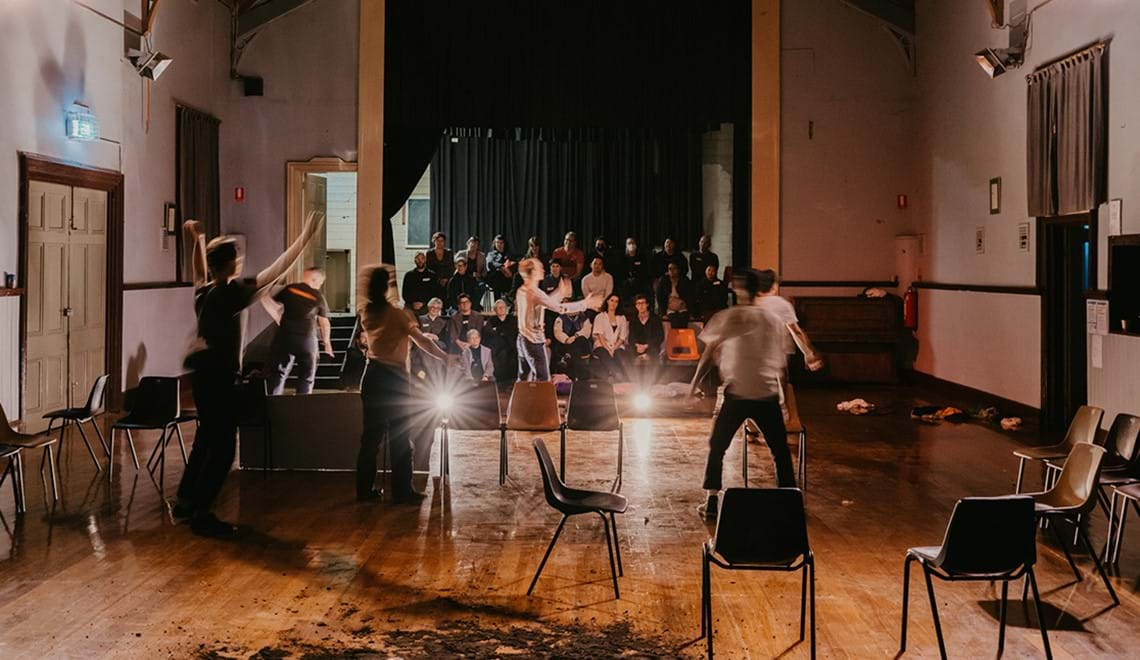Theatre and live performance have a dual ontology. They exist in the medium of presence – here and now, in this venue, for this duration of time; yet they have an afterlife in memory. They also have a certain duality insofar as they’re both collective and individual forms of experience. I see a show as a member of an audience who shares this experience; yet I also see it from my own perspective, with my own subjective baggage. Finally, I remember it from yet another vantage-point – perhaps differently each time I do so.
Grand Theft Theatre (which was originally commissioned and performed for Melbourne Fringe in 2022) is both a homage to and playful deconstruction of these various dualities. Over the space of an hour and 55 minutes (broken up by three 6-minute intervals), the five members of Melbourne-based collective Pony Cam and collaborator David Williams (former founder of version 1.0 and now artistic director of Alternative Facts) remember and re-enact moments from performances they’ve seen that have had a formative impact on them as audience-members and artists.
Their memories are necessarily partial and unreliable; the re-enactments even more so. There’s much clowning and lo-fi staging, as well as impressive displays of physical skill, moments of pathos and images of beauty (and occasional horror). The show is as much about the failure of representation as it is about the works themselves.
On arrival, audience members are asked to write their own favourite shows on sticky labels. These become talking points with fellow audience members during each of the intervals, which generates a sense of ephemeral community, not only among the audience, but also between the audience and the performers in terms of shared stories. The community hall setting adds to this non-hierarchical ambience, as does the minimalism and messiness of the staging.
We’re asked to position our own individual plastic chairs wherever we choose (each of these has the name of a well-known or lesser-known theatre-maker attached to it, also written on a sticky label). These are then moved into new configurations by the performers during each of the intervals. Props, costumes, lighting and sound cues are minimal and functional; the performers wear rehearsal clothes (which get progressively more stained during the show); the set is the space itself.
The aesthetics and underlying politics of the work and its makers are influenced by similarly collaborative experimental “post-dramatic” theatre groups like the UK’s Forced Entertainment or the British-German collective Gob Squad. You don’t, however, need to be “in the know” about this (or other) theatrical or artistic references to enjoy the show. The overall approach is lighthearted and (in every sense) accessible. As such it also belongs to a more specifically Australian “larrikin” tradition of circus and physical theatre.
Like the material that’s being remembered and reenacted (which ranges from high art to popular, mainstage to fringe, international to local), there are high points and longueurs in the show, and no doubt everyone in the audience will respond to different things in different ways (as my conversations with strangers during the intervals about their own favourite shows would seem to suggest).
The concept is so rich I found myself wishing for more diversity in terms of the age of the performers (who are mostly in their 20s, except for Williams, who I would guess is in his 40s) and the era from which they drew most of their formative theatrical experiences (the early 2000s).
I also couldn’t help wondering if some of the audience’s favourite theatre memories couldn’t have been communally shared and then spontaneously reenacted by the performers as well, to broaden the range and break down the hierarchy between performers and audience even further.
Read: Theatre review: Milked, fortyfivedownstairs
In the end, there’s something beautiful about the evanescence of theatre and performance, as well as the unrepeatability of all experience, and even the unreliability of language and memory. This sense of beauty lingers after the show is over, in all its imperfections – like life itself.
In the words of the Elvis song that ends the show and aptly describes all our favourite memories: ‘Love me tender, love me sweet, never let me go. / You have made my life complete, and I love you so.’
Grand Theft Theatre, Latvian Hall, Tālava, 4 Clark Street, Kaurna Country, Wayville
Created and performed by Claire Bird, Ava Campbell, Williams Strom, Dominic Weintraub, Hugo Williams, David Williams
Producer: Suzie Franke
Associate Producers: Dominic Weintraub and Hugo Williams
Lighting Designer: Suzie Franke
Tickets: $20-$49
Grand Theft Theatre will be performed until 11 March as part of Adelaide Festival.





